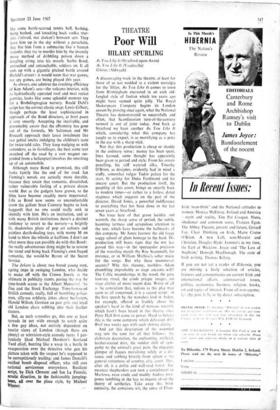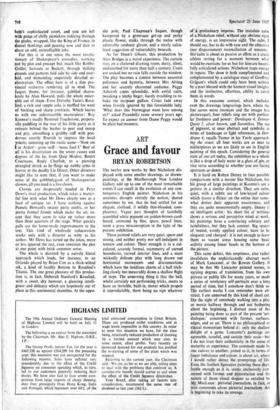THEATRE
Poor Will
HILARY SPURLING As You Like It (Stratford-upon-Avon) As You Like 11 (Vaudeville) Ghosts (Aldwych)
A discouraging week in the theatre, at least for those of us not wedded to a violent nostalgia for the 'fifties. As You Like It comes to town from Birmingham encrusted in an arch old- fangled style of fustian which ten years ago might have seemed quite jolly. The Royal Shakespeare Company begins its London season by proving once again, what the National Theatre has demonstrated so successfully and often, that Scandinavian turn-of-the-century turmoil is out of joint today. And back at Stratford we have another As You Like It which, considering what this company has taught us to expect, is as mortifying as a poke in the eye with a sharp stick.
Not that this production is cheap or shoddy in the ordinary sense: money has been spent, lines learned, some thought has apparently been given to period and style. From his ornate panelling, his stiff watered silks, Timothy O'Brien, as designer, evidently had in mind a stuffy, somewhat vulgar Tudor palace for the start, fit setting for Duke Ferdinand and his uneasy court. But the production itself, the peopling of this court, brings us smartly back to modern times—or rather to a listless, dated staginess which suggests on the part of the director, David Jones, a powerful indifference to everything that has been done in the last seven years at Stratford.
No trace here of that grave lucidity and warmth, the sharp sense of period, the subtle, haunting tartness and scrupulous attention to the text, which have become the hallmarks of this company. Mr Jones favours the old foggy soggy school of glum homage to the bard. His production still bears signs that the RSC has passed this way—in the spectacular precision of the wrestling match (by Roy Scammell), for instance, or in William Mathias's sober music for the songs. But why these mummerset accents? Why this rheumy, toothless Adam chumbling improbably as stage ancients will? The Celtic maunderings in the wood, the gory hunting, ritual, the crude priapic images, are stage cliches of more recent date. Worst of all is Ihe conviction that, tedious as this play may seem to all concerned, it is a sacred script: in the first speech by the nameless lord in Arden, for example, offered as frankly above the speaker's head in the kind of nervous mumhle which hasn't been heard in this theatre since Peter Hall first came to power. Hard to believe this is the same company which delivered All's Well two weeks ago with such shining clarity.
And yet this description of the wounded stag sets the tone for all that follows: the elaborate decoration, the enchanting, artificial, leather-coated deer, the sudden shift of sym- pathy to the animal's great pain, the engaging glimpse of Jaques moralising safely at a dis- tance, and sobbing bitterly from spleen at the general rottenness of country, city, court. This. after all, is a polite and well-read forest. The meanest shepherdess can turn a compliment to Marlowe, even crude and muddy Audrey post- pones tumbling in the hay to inquire about the theory of aesthetics. Take away this brisk curiosity, the conscious wit, the sense of Eliza- beth's sophisticated court, and you are left with gangs of chilly picnickers trekking through the glades, wrapped, like the King of France, in dismal thinkings and pausing now and then to share an odd, unintelligible joke.
For this is in one sense the most revolu- tionary of Shakespeare's comedies, working not by plot and precept but, much like Robbc- Grillet, Sarraute or Beckett, through shifting strands and patterns laid side by side and over- laid, and demanding exquisitely detailed or- chestration. The effect here is of a dim pro- vincial orchestra rendering all to mud. The Jaques theme, for instance, gabbled shame- lessly by Alan Howard, pulls the whole miser- ably out of shape. Even Dorothy Tutin's Rosa- lind, a rich and supple solo, is muffled for want of backing and sharp contrasts. Which leaves us with one indestructible masterpiece: Roy Kinnear's madly flustered Touchstone, perpetu- ally paddling in the rear of his little party as it retreats behind the bushes to peer and snoop and pry; smoothing a grubby cuff with pon- derous courtly flourish to impress the local yokels; summing up the rustic scene—`Now am I in Arden'--grim sniff—`more fool L' Best of all is his dissertation on the seven causes and degrees of the lie, from Quip Modest, Retort Courteous, Reply Churlish, to a piercing strangled shriek as he flings up stubby arms in horror at the deadly Lie Direct. Other directors might .like to note that, if you want to make sense of the gobbledygook of Shakespearian clowns, all you need is a live clown.
Clowns are desperately needed in Peter Dews's rival production, which takes a master- ful line with what Mr Dews clearly sees as a load of antique tat. I have nothing against Pamela Howard's snazzy party outfits, or her pretty formal fronds which make the set, ex- cept that they seem to take up rather more than three quarters of the stage. What quickly palls are the home-made improvements to the text. This kind of wholesale redecoration works only with a director as witty as his author. Mr Dews has tarted up the jokes, more or less ignored the rest, even rewritten the plot at one point with brisk common sense.
The whole is dictated by a naively literal approach which leads, for instance, to an Orlando played by Brian Cox as a thick-witted oik, a kind of loathly Bottom to Rosalind's Titania. The one great pleasure of this produc- tion is, in fact, Deborah Stanford's Rosalind, with a sweet, dry humour, a glancing intelli- gence and delicacy which are hopelessly out of place in this sentimental shambles. At the oppo-
site pole, Paul Chapman's Jaques, though hampered by a grotesque get-up and perky plastic flower, stalks through the melee with admirable sardonic gloom, and a nicely calcu- lated suggestion of vulnerability beneath.
As for Ibsen's Ghosts, this production by Alan Bridges is a weird experience. The curtain rises on a cluttered drawing room, dusty, silent, undisturbed for more than half a century. Coats are soaked but no rain falls outside the window. The play becomes a contest between ancestral politeness and hysteria, between Mrs Alving and her severely chastened audience. Peggy Ashcroft copes splendidly, with awful calm, tweaking a tetchy finger, barely troubling to re- buke the incipient guffaw. Crises fade away when frostily ignored by this formidable lady. `What does this Norwegian want here among us?' asked Pirandello some seventy years ago. To expect an answer from Dame Peggy would be plain bad manners.































 Previous page
Previous page